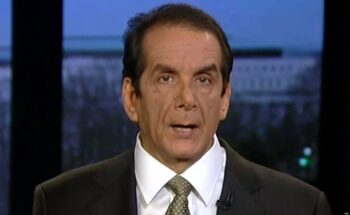By Mark Ellis —

He was the blunt, neo-conservative commentator with an authoritative manner that sometimes may have intimidated lesser mortals. His trenchant analysis of America’s place in the world won him numerous awards including the Pulitzer Prize. Sadly, he left us yesterday after a courageous battle with cancer. He was 68.
A tragic diving accident as a first year medical student left him with an injury that altered the course of Krauthammer’s life, but never impeded his accomplishments. In fact, many casual viewers of his televised presence were surprised to learn he was disabled.
“I had a diving accident actually in a swimming pool right on the grounds of Harvard Medical School, off the diving board, my third dive of the day and hit the bottom with my head,” he told Hugh Hewitt in 2013.
“And my head wasn’t hurt at all. I didn’t even have a scratch. But it severed my spinal cord, and I was hospitalized for 14 months,” he recounted.
Krauthammer refused to give in to a depressed outlook after the accident.
“You can be hopeless and despairing, or you can live your life. And to me, there was basically no option,” he told Hewitt.
And live to the fullest he did. After graduating from Harvard Medical School near the top of his class and making significant contributions in the field of psychiatry, he embarked on a career as a political columnist and commentator in the 1980s, writing for The Washington Post, Time Magazine, and appearing on the PBS news program Inside Washington.
Krauthammer was a contributing editor to The Weekly Standard, a Fox News contributor, and a nightly panelist on Fox News Channel’s Special Report with Bret Baier until August 2017, when he was forced to suspend his work to fight cancer.
His religious views
Krauthammer had Jewish roots, went through a bar mitzvah as a young man, but maintained a mostly secular outlook that caused him to critique intelligent design theory as “tarted-up creationism.”
“I’m not the first to say it. I don’t believe in God, but I fear Him greatly,” he told Hewitt. At the same time he admitted a “complicated view of deity.”
When it came to theology, Krauthammer’s unlikely muse was Einstein. “And not to in any way compare myself to Him, but if I had to, I’d have to say to compare to whose theology do I have the most affinity? I would say probably Einstein,” he noted.
“Einstein had this sense of this fantastic mystery lying behind ordering and creating beauty in nature. I mean, he was so struck by the elegance of nature, his ability to put the ultimate mysteries of science into a single line, E=MC2, indicates a kind of harmony in the cosmos which cannot be accidental, or cannot be sort of unwilled in some sense.”
‘Did the critic of intelligent design allow room for the ultimate designer?’ Hewitt queried.
“He (Einstein) said things, for example, in his rejection of quantum mechanics, he said God does not play dice with the universe, meaning he refuses to accept the physics that depends on probability. That’s not how God works. And he had this sort of reverence and awe,” Krauthammer observed.
“The other analogy I would use is what Newton used to describe the capacity of the human mind,” he continued. “He said our ability to understand is about akin to that of a snail on the shore of an ocean trying to work out the tides through physics. And that, to me, is our position vis-à-vis understanding the workings of the universe, and the wonderful mysteries, awesome, I mean, literally awesome mysteries…that lie behind it.”
Krauthammer found it difficult to embrace traditional religion. “I have enormous respect for it, and in some sense, I’m not a terribly religious Jew, but I follow some of the rituals, and I do attend on the important days. But when it comes to the relationship to what is out there, to me, it is rather complicated and mysterious,” he noted.
A worldview with no God leaves Krauthammer cold. “Of all the theologies or anti-theologies, I think atheism is the least plausible of them all. It’s not only the irrationality, but it’s the coldness, the soullessness of atheism that strikes me. But as to what lies on the other side, I’m the snail on the side of the ocean. I don’t even presume to even be able to begin to understand it. All I know is that it’s far beyond me, and it deserves reverence and awe.”
On a visit to Israel in 2011, he described a visit into the tunnel next to the Western Wall as “the most sacred space on the planet.”
When he stood on Mt. Scopus in northeast Jerusalem, he also felt a connection with God. “You look out on the Judean desert, and you can almost feel what it would have been like to be out there for the 40 years. You can feel the spirituality, the connection with the Transcendent that must have occurred in those places.”
“It is a most astonishing experience to be at that crossroads of the world where all of these great spiritual events happened, and how the three great religions are all centered on that one space as sort of the center of the intersection of the Divine and the human,” he said.



